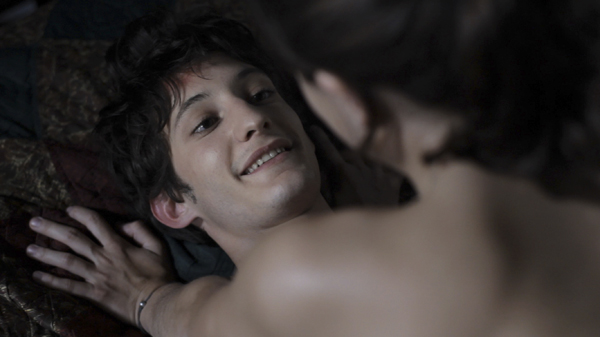
Pierre Niney of 18 YEARS OLD AND RISING (Film Society of Lincoln Center)
For those outside of Southern California, the Santa Barbara International Film Festival is a well-kept secret. Sorry to blow it. Though popular on the weekends (it’s an easy daytrip from Los Angeles), there was plenty of ticket availability during the week. An added screening of the Oscar-nominated Bullhead was held in the cavernous 1931 movie palace the Arlington, capacity 2100. With only about 60 in the audience, it was virtually a private screening—bliss. And with temperatures reaching over 70 degrees in February, and not a cloud in sight, the location is a no-brainer for a mid-winter event, whether for business or a movie binge.
For filmmakers, there are advantages to participating in a regional event, even one without the bragging rights of Sundance. Here, the festival’s the only game in town, affording filmmakers media access that they can only dream of in New York. For example, a Sunday 6:00 PM local news broadcast devoted over five minutes to the distributor-less documentary Pretty Old, about an annual beauty contest for seniors, and the Santa Barbara News-Press offered a full page of activities and articles daily.
This year before packed houses at the Arlington the festival presented its annual American Riviera career award to Martin Scorsese and its Virtuoso Awards to six actors hitting professional plateaus last year: Demián Bichir, Rooney Mara, Melissa McCarthy, Patton Oswalt, Andy Serkis, and Shailene Woodley. (All of the above made it to town except for McCarthy.) Earlier in the festival, Viola Davis won Outstanding Performer of the Year and Christopher Plummer the Modern Master Award. (Most festivals just give out one or two honors.) Year to year, the SBIFF reads the tea leaves and imbeds itself into awards season, and the number of journalists and photographers on the red carpet press gauntlet outmatched those of the Tribeca or New York film festivals.
Even though there were six awards to hand out, the Virtuosos evening flew by, thanks to the off-the-cuff shtick of recipients Oswalt and then Serkis, who appeared on stage for his Q & A half-naked (it was a running joke, you had to be there). However, Rooney Mara was particularly reticent. She looked helpless and shrugged her shoulders when asked to name one of her favorite films from last year. And without elaborating, she said she had no qualms about the extended rape scene in The Girl with the Dragon Tattoo, and moderator Dave Karger of Entertainment Weekly left it at that.
Overall, the Scorsese tribute dragged, lasting nearly two and a half hours—Leonard Maltin warned that no one was going home early. How true. Much of what was covered was familiar, with clips from Taxi Driver, Raging Bull, and Hugo, for which everyone whipped out their 3-D glasses. With time running out, the 1990s and ’00s were ignored. The rarest footage was the inclusion of Italianamerican, a 1974 documentary starring his parents.
Festivals covet a cause célèbre, a polarizing film that grabs attention, assuming that sponsorship and funding are safe and sound. The U. S. premiere of the down-and-dirty Whores’ Glory, a German/Austrian documentary triptych of three red-light districts in the developing world, delivered. As one of the programmers stated before the screening, “It’s not for everyone.”
The first part opens with a gliding tour through bright-lights-big-city Bangkok to a trip-hop soundtrack, like an outtake from Gaspar Noé’s Enter the Void. (Tricky and the ubiquitous Antony and the Johnsons provide tracks.) Most of director Michael Glawogger’s attention is devoted to the women working in the bar the Fishtank, who sit behind a glass wall with numbers attached to their dresses, scrutinized by customers from all over the world. If a woman is chosen, the john pays upfront (credit cards accepted) before taking an elevator down into a bedroom. The second segment ventures to the City of Joy, Bangladesh, where the drop in living standards is sobering. Many of the girls look barely older than 12.
Unless you’ve been living in the most remote nunnery, it won’t take much imagination to guess what goes on behind closed doors, or to know that none of the women makes much money. Among other non-revelations, a street vendor admits he seeks prostitutes to enjoy himself, and one Thai prostitute reasons that “A job is a job,” but several disarming moments of honesty in the talking-head interviews stand out.
Yet… what is in it for the women to appear in the film? The chance to be heard? The attention? The final third, set in Reynoso, Mexico, is the most problematic. Not once but thrice a woman, high as a kite, completely strips for the camera, either in a bar or striding down the street. In the most obvious stagey sequence, a skinny man in his twenties drives up in front of the roadside motel-like brothels, and the cameraman follows him inside. So that’s what goes on. (You might also learn a thing or two from a woman who claims to have been the whore of Reynoso.) To call the film poverty porn wouldn’t be too flippant. The lens even catches dogs getting it on a Bangkok street. But whatever qualms there may be, it’s never less than compelling and entirely atmospheric, vulgar, and boundary bursting.
Last year, Giorgos Lanthimos’s weirdly sinister Dogtooth was nominated was best foreign-language film (a surprise if ever there was one in that Oscar category). His equally creepy second film Alps is also an overly elaborate riddle. Like in Dogtooth, the allure is trying to figure out the rituals, how far the participants play within the insular rules, and picking up the film’s inner logic. Two men and women are emotional substitutes, sort of mercenaries of mercy, taking on the identity of a deceased for the benefit of the bereft. However, one of the team players goes rogue, veering away from her assigned roles. Woe to anyone who breaks the rules.
If the acting comes across as stiff, it’s intentional. But because everyone assumes many personas, we don’t know who the real person is, and we don’t care. Mostly the tone is so deadpan that the film feels very constricted and airless. Both Alps and Whores’ Glory will screen in the Film Comment Selects series in New York and will be released by Kino Lorber.
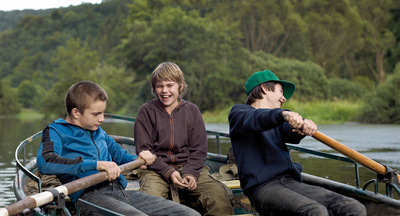
The boys of THE GIANTS (Patrick Muller/UniFrance)
The programming selections were, by and large, a cross section of the multiplex alternative. The Giants (Les géants), from Belgium, uncannily captures the awkwardness between adolescence and the full-on teen years—no longer kids, but certainly not mature, physically or emotionally. Three resourceful, contemporary Huck Finns set out on their own in the hilly countryside during a desultory summer. Brothers Zak and Seth have been abandoned by their (never seen) mother and wait for her to call—there’s no father in the picture. The only adult men they know are the local drug dealers. Living in their dead grandfather’s house, the boys are running out of food and don’t even have enough money to buy weed. They hang out with Dany, who has run away from his abusive older brother. Despite this summary, the setting is not the bleak, overcast Belgium that’s often seen in movies. The kids take things in stride, at times laidback and then rambunctious. Breezy and ominous, the film will sneak up on you, and look for a cameo from 1970s international It girl-turned-director Marthe Keller.
Fecklessness, thy name is Primo. One of the acting discoveries at the festival was the gangly Pierre Niney in 18 Years Old and Rising (J’aime Regarder les Filles). Lanky and with a long face and unruly hair, Primo’s an unassuming pretty boy (Big Bird comes to mind), but Primo knows how to make a girl laugh. The joke may be at his expense, but he leaves the party with plenty of phone numbers. Women instantly want to baby him.
He’s away from home on his own in Paris preparing for university, spending all of his parents’ money trying to keep up with a clique of right-wing rich kids during the 1981 election of leftist President François Mitterand. Primo’s not drawn to their politics but their lifestyle (the chance to summer on the Riviera) and a demure blond bombshell. He plays everyone to his advantage—especially his mother, who has spoiled him rotten. Narcissistic, with a mix of vulnerability and charm, he just wants to be liked, even though he often needs a good slap across the face. Slowly, Primo become less self-involved and falls from the pedestal in his imagination.
The knowing comedy certainly lives up to the stereotype of the French laissez-fare attitude towards sex. Where else would a father makes his daughter breakfast after she’s brought a boy home—while she wears the guy’s underwear to the kitchen table? The film screens next month at New York’s Rendez-Vous with French Cinema.
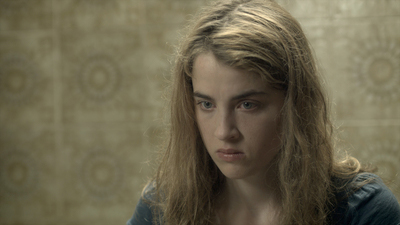
Adele Haenel in HEAT WAVE (UniFrance)
In the description for Heat Wave (Après le Sud), the festival program guide too-cautiously warns that it “contains graphic sex and nudity.” The noteworthy directorial debut by Jean-Jacques Jauffret is an example of the private-in-public school of acting. The disrobing, far from tantalizing, is matter of fact and discomforting. All four lead characters strip down, one way or another. Ten years ago, intertwining French narratives were all the rage. Here four storylines are loosely connected through a mother and daughter. True to the threat hinted in the first frame, where an elderly pensioner cleans a rifle, it ends in violence. Despite the too-unified ending, each thread holds up on its own harrowing terms. The fragments are more persuasive than the whole. Of all the films seen at the festival, this had the strongest ensemble, with actresses Sylvie Lachat, whose character endures an incredible panic attack, and Adele Haenel, a sleepy-eyed Sharon Stone. (She’s nominated this year for the most promising actress César Award for House of Pleasures).
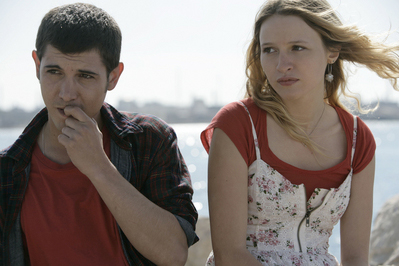
Johan Libéreau and Christa Theret in TWIGGY (UniFrance)
The last film I took in offered another discovery, the Botticelli-like beauty of Christa Theret in the oddly named Twiggy. The French title, La Brindille, translates as “the stick.” (Theret is also up for the same César award as Haenel.) At 81 minutes, the methodical drama is concise and subtle, but never underpowered. Theret plays Sarah Dole, a 20-year-old university student who learns she’s six months pregnant, and she’s not even showing. Apparently, this does happen, even when a woman is eight months along, and I chose to trust the film’s word on this matter. However, Sarah doesn’t want the baby. She throws away the sonogram, misses doctor’s appointments (and doesn’t care), doesn’t tell her mother, and keeps to herself from other expecting single mothers. If you believe in the horoscope, you’ll totally understand her stubbornness—she’s a Taurus.
Another film filled with beautiful moments, the lovely Italian charmer Horses (Cavalli) is an old-fashioned throwback to the 1970s, offering the similar raw and rustic charm of Ermanno Olmi’s The Tree of the Wooden Clogs. Set in the northern hinterlands sometime before World War I, two young boys are let loose onto the world by their stern alcoholic father after the death of their protective mother (Asia Argento). All they have are their clothes on their backs and their horses. (Like Spielberg’s old Hollywood take on War Horse, this is a reminder of a time when a horse was a huge investment and crucial to a farmer’s livelihood.) One brother goes off to live with a surrogate farming family, the other hits the big city, well, the local village. Politics of class permeate this simple and affecting allegory, which depicts a way of life too harshly to succumb to sentimentality. Life is unfair. It’s how you deal with it that counts.
The festival is not entirely Eurocentric. One of the films earning the strongest word of mouth was Lucky, from the new South Africa, where, in the words of an elderly Indian woman, “You have to tolerate,” even reluctantly. This crowdpleaser gently pulls your heart strings, and because of director Avie Luthra’s restraint and trust in the material, it leaves the emoting to the audience. And that’s quite an achievement considering the story, prime for emotional excess. After the death of his mother (from AIDS), 10-year-old Lucky leaves his dusty Zulu village for Durban to live with his uncle, who spends the money meant for his education on booze and his girlfriend (the couple is the film’s only one-dimensional characters). Reluctantly, the stern Indian neighbor takes him in after his uncle throws him out on the street and helps the tenacious orphan search for his father.
Besides international art house fare, the festival bestowed its audience favorite award to the French-Canadian Starbuck, an amicable situation comedy where a middle-aged ne’re-do-well man/child finds out his sperm donations back in the ’90s have paid off huge dividends: he fathered hundreds of offspring, and 144 want to contact him. It also threw a spotlight on star-driven, low-to-medium budget dramas that are not exactly easy to market: Ethan Hawke and Kristin Scott Thomas in the mind-bender The Woman in the Fifth and Vincent Cassel in the lurid medieval allegory The Monk. At least one film will open nationwide next month, Salmon Fishing in the Yemen, which contains almost three movies in one: satire (Kristin Scott Thomas, again, barrels through the film as a political operative barking into her Bluetooth), romcom, plus a little bit of a thriller. Emily Blunt and Ewan McGregor make a great couple, and they clearly enjoying the sparing banter. After Beginners, McGregor has cornered the market as the self-effacing, reserved romantic lead.



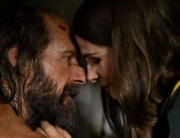


Leave A Comment